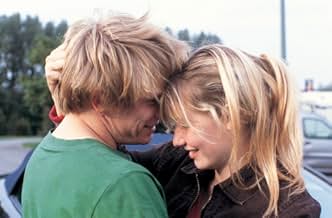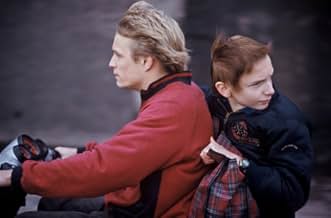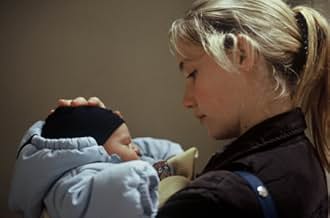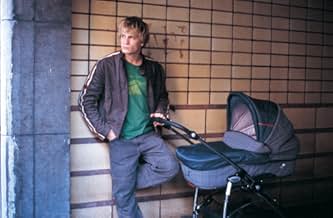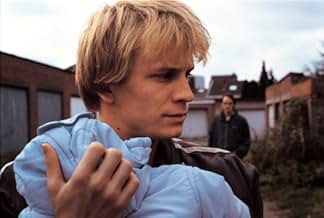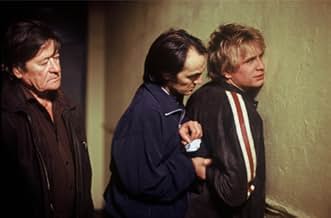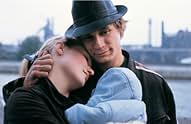VALUTAZIONE IMDb
7,4/10
19.920
LA TUA VALUTAZIONE
Aggiungi una trama nella tua linguaBruno and Sonia, a young couple living off her benefit and the thefts committed by his gang, have a new source of money: their newborn son.Bruno and Sonia, a young couple living off her benefit and the thefts committed by his gang, have a new source of money: their newborn son.Bruno and Sonia, a young couple living off her benefit and the thefts committed by his gang, have a new source of money: their newborn son.
- Regia
- Sceneggiatura
- Star
- Premi
- 14 vittorie e 21 candidature totali
Anne Gerard
- Commerçante
- (as Anne Gérard)
Leon Michaux
- Policier Commissariat
- (as Léon Michaux)
Recensioni in evidenza
When the single mother Sonia (Déborah François) returns home with her newborn son, she finds that the baby's father Bruno (Jérémie Renier) had rented her apartment for a couple. She seeks out Bruno, who is a small time young thief that has a gang with two other teenagers, on the streets and they go to a shelter to stay during the cold night. On the next morning, they register the child with the name of Jimmy. When Bruno receives a proposal from his dealer for selling Jimmy for adoption for five thousand Euros, he steals the baby and sells him to his contact. However, when Sonia discovers what Bruno did, she faints, goes to the hospital and reports the transaction to the police. Bruno calls off the transaction and retrieves Jimmy, but has to pay to the dealers another five thousand Euros, in the beginning of his descent to hell and final redemption.
The low-budget "L'Enfant" is actually the realistic story of Bruno, an indifferent and alienated young scum originated from the upper class but without job for option that steals, lies, manipulates, wanders on the streets and seems incapable of displaying love, remorse or any other human feelings. Sonia is not well developed and the viewer never knows who she actually is and why she felt in love for Bruno. Jérémie Renier and Déborah François have awesome performances in the lead roles. The conclusion is disappointing since the final redemption of Bruno is inconsistent with his character. Maybe the intention of the writers and directors Jean-Pierre and Luc Dardenne is to give some hope to the audience instead of the expected dark and credible ending. My vote is eight.
Title (Brazil): "A Criança" ("The Child")
The low-budget "L'Enfant" is actually the realistic story of Bruno, an indifferent and alienated young scum originated from the upper class but without job for option that steals, lies, manipulates, wanders on the streets and seems incapable of displaying love, remorse or any other human feelings. Sonia is not well developed and the viewer never knows who she actually is and why she felt in love for Bruno. Jérémie Renier and Déborah François have awesome performances in the lead roles. The conclusion is disappointing since the final redemption of Bruno is inconsistent with his character. Maybe the intention of the writers and directors Jean-Pierre and Luc Dardenne is to give some hope to the audience instead of the expected dark and credible ending. My vote is eight.
Title (Brazil): "A Criança" ("The Child")
Dramatic, realistic, proposing honest portrait of an age, generation, near reality. A film about parenthood. Bitter, cold, well made. And about the build of responsability. All - gived in wise manner. With admirable force. A father. His son. A decision. And the transformation. And the price of option.
Bruno (Jérémie Renier, magnificent) and Sonia (Déborah François, who reminds me of a younger Julie Delpy) are immature, teen lovers. They live on the streets of Seraing, Belgium, getting money from Bruno's gang's petty crimes. Sonia gives birth to a baby boy, Jimmy, but Bruno is totally indifferent. He sells his newborn son without Sonia's consent, and she has a nervous breakdown when he tells her what he did. Bruno then goes against all odds to get Jimmy back, but it won't be an easy ride.
"L'Enfant" is a beautiful, raw poetry about children who haven't grown up, and have their own kids without even knowing how to care of themselves. This is a film of silences, gestures that say more than a thousand words. "L'Enfant" is the first film by Luc and Jean-Pierre Dardenne that I've had the opportunity to watch, and I couldn't be more satisfied. After reading great things about some of his other films - "La Promesse" (1996), "Rosetta" (Golden Palm at Cannes 1999), "Le Fils" (2002, Olivier Gourmet was awarded Best Actor at Cannes) -; now I understand why they're considered some of the most talented names making films nowadays. Their honesty and strength to tell this poignant story, which could easily become an absurd melodrama, is mindblowing. "L'Enfant" gave the Dardenne brothers a second Golden Palm at Cannes, and hopefully the pompous award will make more people curious to check this work of art. Nothing is as simple as it seems, and as we get into the nightmarish world of Bruno, we see he's not only an immature, cruel lad who sold his own kid, but someone who hasn't even begun to live.
Sad and remarkable, "L'Enfant" has some similarities with Hector Babenco's classic "Pixote - A Lei do Mais Fraco" (1981) and is certainly one of the year's best. 10 out of 10.
"L'Enfant" is a beautiful, raw poetry about children who haven't grown up, and have their own kids without even knowing how to care of themselves. This is a film of silences, gestures that say more than a thousand words. "L'Enfant" is the first film by Luc and Jean-Pierre Dardenne that I've had the opportunity to watch, and I couldn't be more satisfied. After reading great things about some of his other films - "La Promesse" (1996), "Rosetta" (Golden Palm at Cannes 1999), "Le Fils" (2002, Olivier Gourmet was awarded Best Actor at Cannes) -; now I understand why they're considered some of the most talented names making films nowadays. Their honesty and strength to tell this poignant story, which could easily become an absurd melodrama, is mindblowing. "L'Enfant" gave the Dardenne brothers a second Golden Palm at Cannes, and hopefully the pompous award will make more people curious to check this work of art. Nothing is as simple as it seems, and as we get into the nightmarish world of Bruno, we see he's not only an immature, cruel lad who sold his own kid, but someone who hasn't even begun to live.
Sad and remarkable, "L'Enfant" has some similarities with Hector Babenco's classic "Pixote - A Lei do Mais Fraco" (1981) and is certainly one of the year's best. 10 out of 10.
The Dardennes, who won their second Palme d"Or at Cannes this year with "L'Enfant" (The Child), describe it as "a love story that is also the story of a father." Twenty-year-old Bruno (Jérémie Renier) is a petty thief and scam artist in Seraing, an east Belgian steel town, who lives off his girlfriend's welfare and impulsively spends whatever he steals. When eighteen-year-old Sonia (Déborah François) returns after the birth of their son Jimmy, Bruno's far worse than merely unready to accept the responsibility of fatherhood. Unbeknownst to Sonia, he decides to sell the baby on the black market. The film is about what happens following this grotesquely ill-advised decision. Who is really the "child" here? Well, clearly the story is about Bruno.
"L'Enfant" is urgent with movement and has little talk. As with the 1996 "La promesse" (The Promise, 1996), where Jérémie Renier debuted, "Rosetta" (1999), and "Le Fils" (The Son, 2003), the action is ceaseless and obsessive and seems almost real-time. But the Dardennes make every minute count. In those rare moments when the hyper-kinetic Bruno is momentarily still and the camera looks into his face, there's a strong sense of the doubt that will lead to his transformation. When Bruno tells Sonia "I'm sorry," or "I need you" and "I love you" the words carry weight because he doesn't normally ever say such things. But Sonia says, "You lie as you breathe." "L'Enfant" is as powerful and accomplished as anything the Dardennes have done, and as thought-provoking.
"L'Enfant" is urgent with movement and has little talk. As with the 1996 "La promesse" (The Promise, 1996), where Jérémie Renier debuted, "Rosetta" (1999), and "Le Fils" (The Son, 2003), the action is ceaseless and obsessive and seems almost real-time. But the Dardennes make every minute count. In those rare moments when the hyper-kinetic Bruno is momentarily still and the camera looks into his face, there's a strong sense of the doubt that will lead to his transformation. When Bruno tells Sonia "I'm sorry," or "I need you" and "I love you" the words carry weight because he doesn't normally ever say such things. But Sonia says, "You lie as you breathe." "L'Enfant" is as powerful and accomplished as anything the Dardennes have done, and as thought-provoking.
Although I have not seen all other Cannes' comp. films, I think this is a worthy winner of the Palm d'or. The film's scenery is gray Seraing, like the previous Dardenne films, and I think this is the first film in which the camera-work complements the scenery and story near perfectly. Scene's often contain only one or two shots, cutting right when everything has been said. Its one of the few films where I did not notice the camera (I'm a student cameraman), which should be the goal of every cameraman, at least in this style of film. The acting is very impressive (especially Jeremie Renier as Bruno), like previous Dardenne Films. The film seems the most accessible Dardenne so far, although it does not bore in simplicity (I saw it twice in one week, avant-premiere and sneak preview, and I liked the second time best).
Lo sapevi?
- QuizJimmy is played by 40 different babies.
- ConnessioniFeatured in Smagsdommerne: Episodio #3.17 (2006)
I più visti
Accedi per valutare e creare un elenco di titoli salvati per ottenere consigli personalizzati
- How long is The Child?Powered by Alexa
Dettagli
- Data di uscita
- Paesi di origine
- Siti ufficiali
- Lingua
- Celebre anche come
- The Child
- Luoghi delle riprese
- Rue de la Banque, Seraing, Liège, Wallonia, Belgio(Sonia's apartment exteriors)
- Aziende produttrici
- Vedi altri crediti dell’azienda su IMDbPro
Botteghino
- Budget
- 3.600.000 € (previsto)
- Lordo Stati Uniti e Canada
- 651.941 USD
- Fine settimana di apertura Stati Uniti e Canada
- 44.537 USD
- 26 mar 2006
- Lordo in tutto il mondo
- 5.507.396 USD
- Tempo di esecuzione
- 1h 35min(95 min)
- Colore
- Mix di suoni
- Proporzioni
- 1.66 : 1
Contribuisci a questa pagina
Suggerisci una modifica o aggiungi i contenuti mancanti


